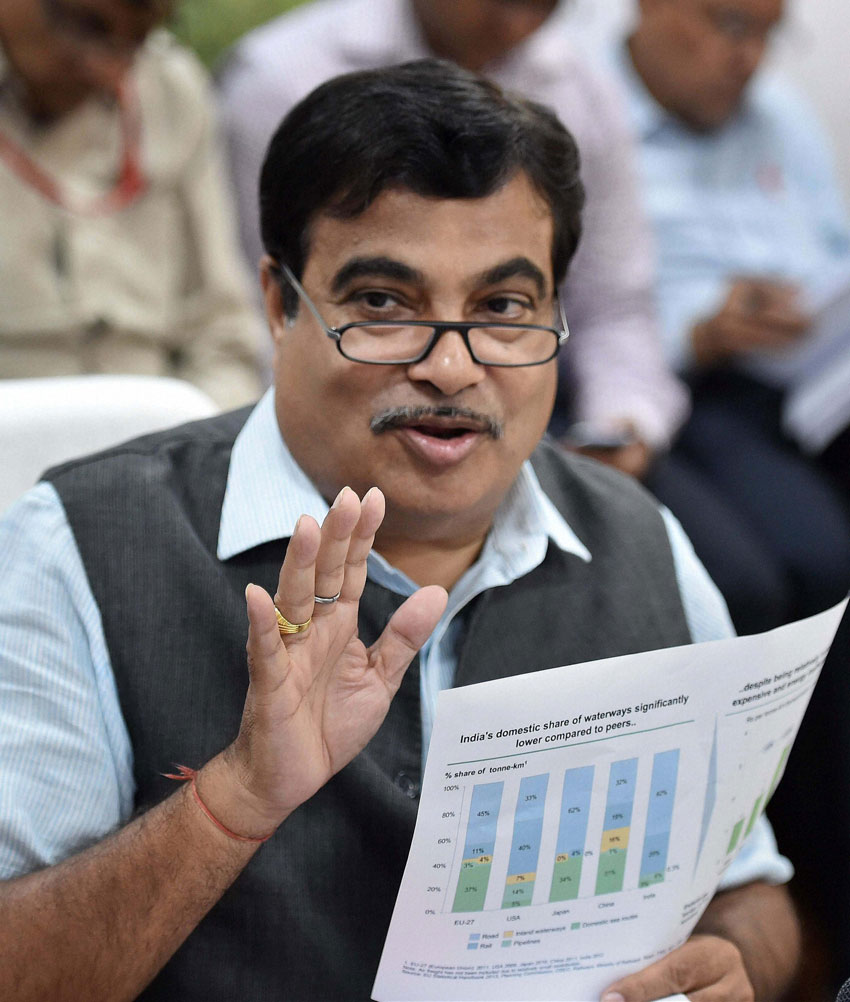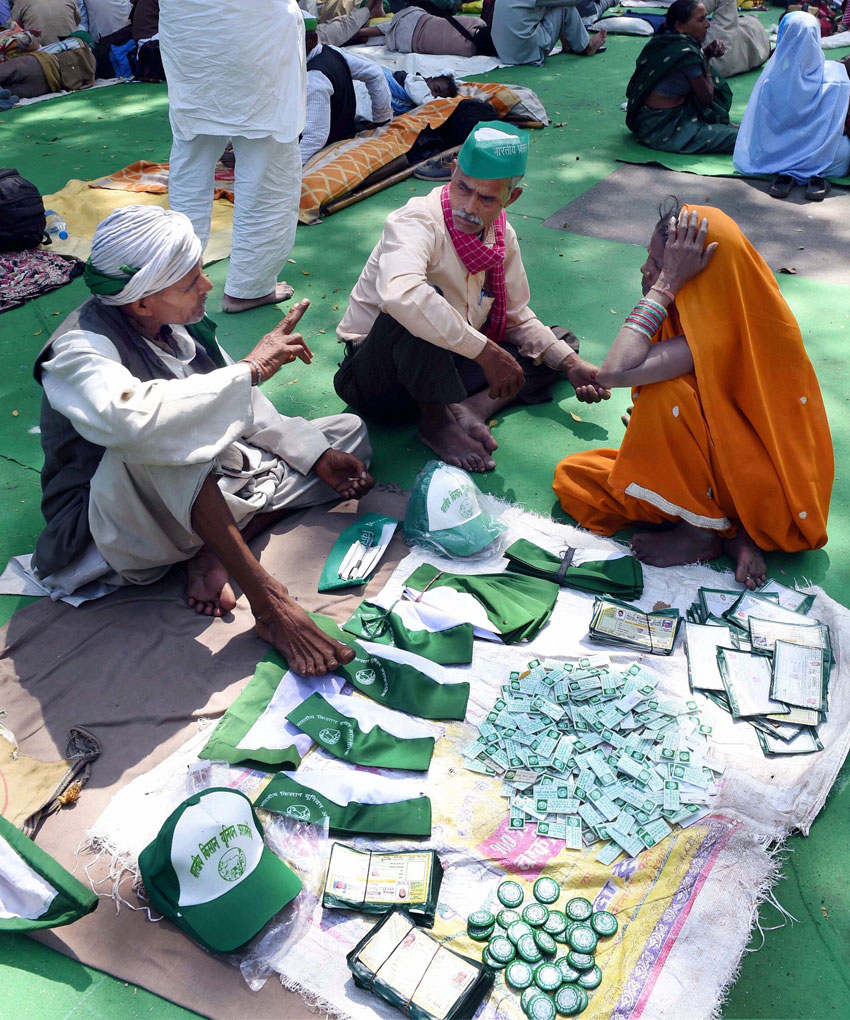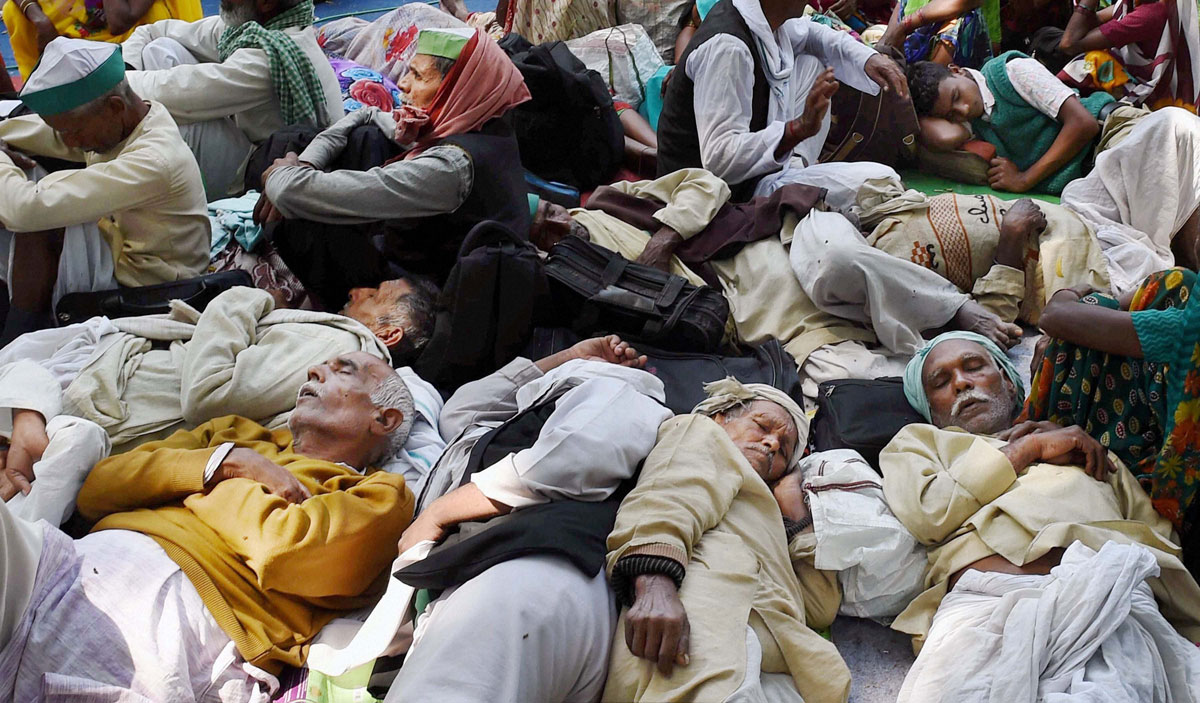LAND BILL
Farmers during the third day of their protest against the Land Acquisition Bill, at Parliament Street in New Delhi, Mar. 20. (Atul Yadav | PTI)
In response to the recent stiff opposition and mobilization on the Land Acquisition, Rehabilitation & Resettlement (LAAR – Amendment) Bill 2015, Union Transport & Shipping Minister, Nitin Gadkari of the Bharatiya Janata Party (BJP)-led National Democratic Alliance (NDA) II government at the center is reaching out to prominent leaders of opposition political parties such as Sonia Gandhi and social activist Anna Hazare for the passage of the Bill in the Upper House or Rajya Sabha of the Parliament where the BJP lacks a majority, writes Priyanka Bhardwaj.
Before the government sought passage of the Bill in the Lower House of Parliament or Lok Sabha on March 10th, it had incorporated 9 significant amendments to accommodate the wishes of the Opposition and interests of farmers.
However, an aggressive Opposition appears to be determined to block the legislation’s passage in Rajya Sabha and in keeping with this hardline stance it has submitted a memorandum to the President Pranab Mukherjee wherein the doctrine is clearly defined as “anti-farmer”, “anti-rural” and “anti-poor.”
Congress president Sonia Gandhi also led a joint campaign of 14 political parties to the Rashtriya Bhavan (President’s House), raising the chant of “Narendra Modi Kisan Virodhi” (Prime Minister Narendra Modi is anti-farmer) and later wrote to Hazare on her commitment to struggle against the anti-farmer draft legislation on all possible fora.
Her written reply to Hazare’s March 14th communiqué underlined the inadequacies of the “The Right to Fair Compensation and Transparency” clause in the bill.
This development can be termed nothing short of being dramatic, considering that Hazare had led the anti-corruption movement, two years ago, when the Congress-led UPA-II ruled at the center.

Seeking support of the farmers on this issue and his economic reform agenda Prime Minister Modi addressed them on his monthly radio address, “Mann Ki Baat,” and accused the Opposition of spreading falsities and misinformation and ensuring a remittance of four times the market value for the land the government would acquire, and compulsory employment for at least one member of the seller’s family.
But since last May’s spectacular win in the General Elections Modi’s promise of facilitating more than 50 percent profit margin to holders of small farm land still remains unfulfilled.
Rather farmers’ hardships have worsened with unseasonal rains, prices of food commodities have risen sharply and the country is registering a steady increase in farmer suicides.
With the center unrelenting on upping the minimum support price of crops, more political ammunition is at the disposal of the Opposition to taint the government as an upholder of interests of the big industrial and business houses vis-a-vis the lower socio-economic strata.
Till 2013 land acquisition was being governed by The Land Acquisition Act, 1894.
On January 1, 2015 the current government brought out an ordinance — “The Right to Fair Compensation and Transparency in Land Acquisition, Rehabilitation and Resettlement Act with a mandate “to meet the twin objectives of farmer welfare; along with expeditiously meeting the strategic and developmental needs of the country.”
This ordinance that remains valid till April 5th if not ratified in the Upper House includes important changes and provisions mention limiting the breadth of an industrial corridor to a kilometer on either side of highways and railway lines; an offer of employment to one member of every farming family that has to sell its land; and a grievances procedure over land purchases at local level.
The Bill denotes five special categories of land use — defense, rural infrastructure, affordable housing, industrial corridors, and infrastructure projects including Public Private Partnership (PPP) projects where the central government owns the land.
These categories enjoy exemptions from the consent clause that requires 80 percent landowners to provide consent for private projects and of 70 percent of landowners for PPP projects, from any Social Impact Assessment, or multiple restrictions on the acquisition of irrigated multi-cropped land imposed by LARR Act 2013.
The LAAR Act would also determine the lines along which compensation, rehabilitation, and resettlement under other related Acts such as the National Highways Act and the Railways Act would be granted.

An amendment changed the acquisition of land for private companies mentioned in LARR Act, 2013 to acquisition for ‘private entities’ (companies, corporations and non-profit organizations).
Another amendment reads: “If the possession of land has been taken by the government agency within five years, the retrospective clause would not apply as long as the government agency acquiring the land had deposited the compensation account in courts or any account maintained for the purpose; and, no court can take cognizance of any crime committed by officials under the Act, without the prior approval of the state concerned or the central government.”
A scrutiny of these amendments does not lend much credence to the government’s argument that the proposed land reforms balance the rights of farmers with the urgent need of development.
Land legislation is a crucial piece of statute due to the importance of land in the production of any kind of goods and services.
Historically land holdings in India have been not an easily verifiable entity, and thus its acquisition becomes a tricky issue. Adding to the unpopularity of government’s expropriation among citizenry is the forcible “development induced displacement.”
According to academicians, since Independence close to 21.6 million people have been displaced due to large-scale projects like dams, canals, thermal plants, sanctuaries, industrial facilities, and mining. Remittances have been infamously low with regard to the current index of prices prevailing in the economy and even the displaced human capital hardly gains any adequate employment.
Many estimates suggest that more than a million tribal or “adivasis” have been displaced, giving rise to a number of political and social resistances that pose a major internal threat to the security of life and property in the country.
Besides the endangering of food security of displaced farmers and sharecroppers, who form an important vote bank, the indirect consequences have also been observed on decentralized and participatory democratic processes and other institutions of state power.
Now for the new law to be able to dispense justice and ensure development, it has to provide with an accurate socioeconomic impact assessment provision and allow the constitutional local self-governments to authorize in the acquisition processes.
Any failure to pass the law in the current session in both houses of the Parliament would result in a lapse of the ordinance and to prevent that the PM could convene a rare joint session of Parliament and muster a majority on paper.
For sure this may lead to aggravation of an already fractious relationship of the Center with the Opposition.
In this din what one fails to ignore is that while on one hand the central ministers are fire-fighting for the ratification of the Bill, Haryana’s Manohar Lala Khattar-led BJP government has instituted an inquiry in the acquisition of five acres of land in Ullawas village in Gurgaon by Rajiv Gandhi Charitable Trust, linked to Sonia Gandhi, for building an eye hospital by 2014 and is mulling over handing the land back to the farmers.


